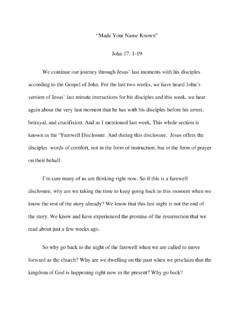Transcription of “We Have a Hunger for God” Psalm 63: 1-8
1 We Have a Hunger for God Psalm 63: 1-8 This Sunday, we begin our Lenten Journey and over the next several weeks, we will explore the many ways we are called and are able to satisfy our Hunger for God. As I sat down to plan out this Lenten theme, I came across a quote by one of my favorite authors, Philip Yancey. He simply said that we all have a Hunger to know God but it seems like that Hunger can never really be satisfied simply because we tend to treat our relationship with God like any other relationship that we may have in our lives. He suggested that over the years, humankind has lost our connection to God because we have forgotten to nurture that innermost being that connects us to God. We ve tried to satisfy our Hunger for God with other things, with other stuff, things like money, power, things like the health and wealth gospel, things like a comfortable lifestyle. He says that we have even tried to satisfy our Hunger for God with love, love for our families, love for our friends, love for others, but even this does not satisfy us completely because after all, this type of love fails.
2 It fails because it is a human love. It is imperfect. And as much as we might try, it is still a conditional type of love. It fails us time and time again because we expect too much from it. We become disappointed and feel empty when this human love that we all count on just proves that in reality all our relationships involve broken and imperfect humans just like ourselves. And in our disappointment, in our emptiness, we try everything to fill the void but still we have this Hunger , this longing that won t go away, that won t be satisfied. And so we search. And We wait. And sometimes we start down a dangerous path, a path that leads us to give up. But Yancey says, Don t give up! That s what our Lenten journey is all about, a time to reconnect with God, and rediscover our appetite for God. I will share that the funny thing about our Lenten theme is that we are not the only ones talking about our Hunger for God along our Lenten journey.
3 As I was figuring out Scriptures and fleshing out the theme, I realized that many of my colleagues were having the same kind of conversations with their own churches, churches across the nation, churches in all kinds of denominations. It seems like everyone for Lent is talking about this Hunger for God we have as people of faith. As I pondered what this may mean, I realized that there may be more going on here than just a really great Lenten Theme. Maybe the Spirit of God is trying to wake us up to the fact that there is something more to our relationship with God. Maybe the Spirit of God is telling us that its time we took a deeper look at this Hunger , this need, this want to know God more, our want and need to be connected with something beyond ourselves. Maybe the Spirit of God is telling us that we have this Hunger for God that won t be satisfied until it is filled with the goodness of God for a reason.
4 I find it a little surprising and a little telling that in an age where church attendance is down, there seems to be no lack of people who are hungering, who are longing, who are seeking, who are waiting upon the Lord. That although people are saying that they are not religious, they are still spiritual and are still looking for ways to grow and nurture that spirituality. I also find that it comes as no surprise that some of the most powerful images in the Bible have to do with food and satisfying Hunger . On a very basic level, even back then, people understood that eating food was more than something we did because it tasted good. Food, nourishment was needed for survival. Even back then, people understood that Hunger signaled a need for something more than what it was getting. When the Hunger pains started, they understood that the body wasn t getting enough good stuff to sustain life.
5 They understood that the body needed to be satisfied with life giving things. Knowing all that, I also find it no surprise that in a world where physical Hunger runs rampant, that spiritual Hunger runs rampant as well. Maybe this year, by putting the same theme, the same words on the people of God s heart, God is trying to get our attention. Maybe God knows we as people of faith, we finally realize that we need something more to sustain our faith. Maybe God knows if we don t that we are literally wasting away as the people of God all because we are not eating from the goodness of God, that we would rather fill up on stuff that satisfies our Hunger but is ruining our appetite for God. Maybe, in this time, and in this place, the Spirit of God is inviting us all to step away from the fast food type of religion, food that is so full of grease and all the stuff that is not good for us, to step away from the type of food that we can eat and then an hour later, we are hungry again.
6 Maybe the Spirit of God is inviting us on this Lenten Journey to step away from the world and come back to God s Table of Welcome, a table that is full of good stuff, full of life giving things. Maybe God is inviting us to partake of the Bread of Life once more so that we will never be hungry again. I remember growing up, when we would ask for a snack before dinner that mom would always say to us that we were going to ruin our appetite and that we wouldn t be hungry when it came time for dinner. Maybe that s what God is saying to us now. Don t ruin your appetite for God with sweet stuff or junk food. Come and nourish our souls. Eat from the Bread of Life and never be hungry again . Maybe it is time we listen. Back then, I didn t get it when mom said this to us but now I get it. I am more aware of nutrition and know exactly what it takes to keep my body healthy. And though I swore I would never say it to my kids, I find myself saying all the time now, No snacks before dinner.
7 You ll ruin your appetite . Maybe it is time for us to stop ruining our appetite for God with other stuff, and really look for ways to satisfy our Hunger for God, look for ways to make our relationship with God stronger, and look for ways that we can truly partake of the Bread of Life so that we will never be hungry again. This Lenten journey we are invited to satisfy our Hunger for God and one way we can do that is to begin to push away from the table of the world and return to God s Welcome Table by taking a look at what the Word of God has to say for the people of God. I invite you to hear this words: (Read Text) As I have shared in the past, the psalms are my go to Scriptures. They have it all: anger, doubt, hope, grief, joy, death, new life. And Psalm 63 is no different. In the very first verse, we can hear the desperation in the psalmist s voice. He is longing for God. Somehow, some way, the psalmist has become disconnected from God and he is hungry.
8 He is thirsty for God. The psalmist needs to be renewed to life once more. In this Psalm , we hear the phrase that the psalmist is in a dry and parched land and immediately our minds go to the story of when the Israelites were wandering around in the wilderness for forty years. The story tells us that they were lost. They were confused. They were wandering around in the wilderness, in the desert. And through this wandering, they became hungry. They became thirsty. And not just a little bit but desperately. You see, after wandering around for 40 years, supplies begin to get low. There was no store where they could restock. There was no on-line grocery service where they could have things delivered. And in the wilderness no one, no one delivers take out. The desert, the wilderness is not exactly the best place to wander around with limited to no supplies. It is dry. It is arid. It is sandy.
9 It is hot. I can t image being there for one day, let alone 40 years. But that s where the people of God were, wandering around in the wilderness with little to no supplies and they were hungry. They were thirsty. So they were crying out to God for nourishment. This could have easily been the end of the story for the Israelites but God remembered them. God heard their cries and sent Bread from Heaven. God brought forth water from rocks. Not just once but time and time again. The story tells us that God satisfied their Hunger , that God satisfied their thirst. The story tells us that God took care of God s people time and time again. What we need to realize is this is all background for this Psalm . The psalmist remembers how God feed God s people. The psalmist remembers who God quenched their thirst. The psalmist remembers how God took care of the people of God over and over again. And now the psalmist is crying out for God to do so again.
10 As I said, all good helpful imagery that reminds us that God takes care of us, that God provides for us but the imagery doesn t stop there. There is more to it than just God s care for us. This image also reminds us that in providing for their needs, in satisfying their Hunger , in quenching their thirst, God was also giving them life as well. God was sustaining them. God was giving them hope. God was their only chance for survival. Let me explain: In the original Hebrew, the way this Psalm reads is that the psalmist is the dry and parched land. The psalmist s soul is dry. The pslamist s soul is parched. He is not in some dry and parched land, but rather he is the dry and parched land. He is shriveling up and dying without his God. He has no hope for life. He has no hope for survival. He has no hope for going on. He is dying. He is shriveling up. He is wasting away. Puts a whole new spin on it doesn t it?








